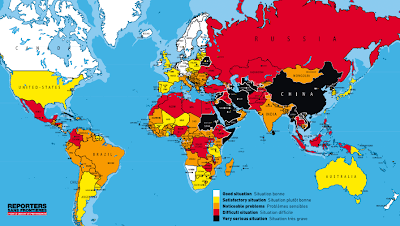Becoming Like China

Reporters Sans Frontiers just came up with their rankings of how much journalistic freedom is allowed in different countries around the world. As with any such system that tries to rank 180 odd countries around the world, a colour coded pictorial representation is what one cares about: One thing I noticed was that the US and much of western Europe (apart from Germany) are graded as “Satisfactory”, not “Good”. Wonder if that downgrade has something to do with the inevitable price of countries facing terrorism? The other thing to note is that India is rated as having “Noticeable problems”. But put that in context of what the rest of Asia looks like: either “Difficult” or “Very serious”, and we don’t look too bad. The road ahead though looks terrible. India’s role model, as per our government, is China. And no, not in terms of economic growth (which we just can’t seem to achieve) or in making Mumbai into a Shanghai. Rather, China is our government’s role model in censorship (remember ...